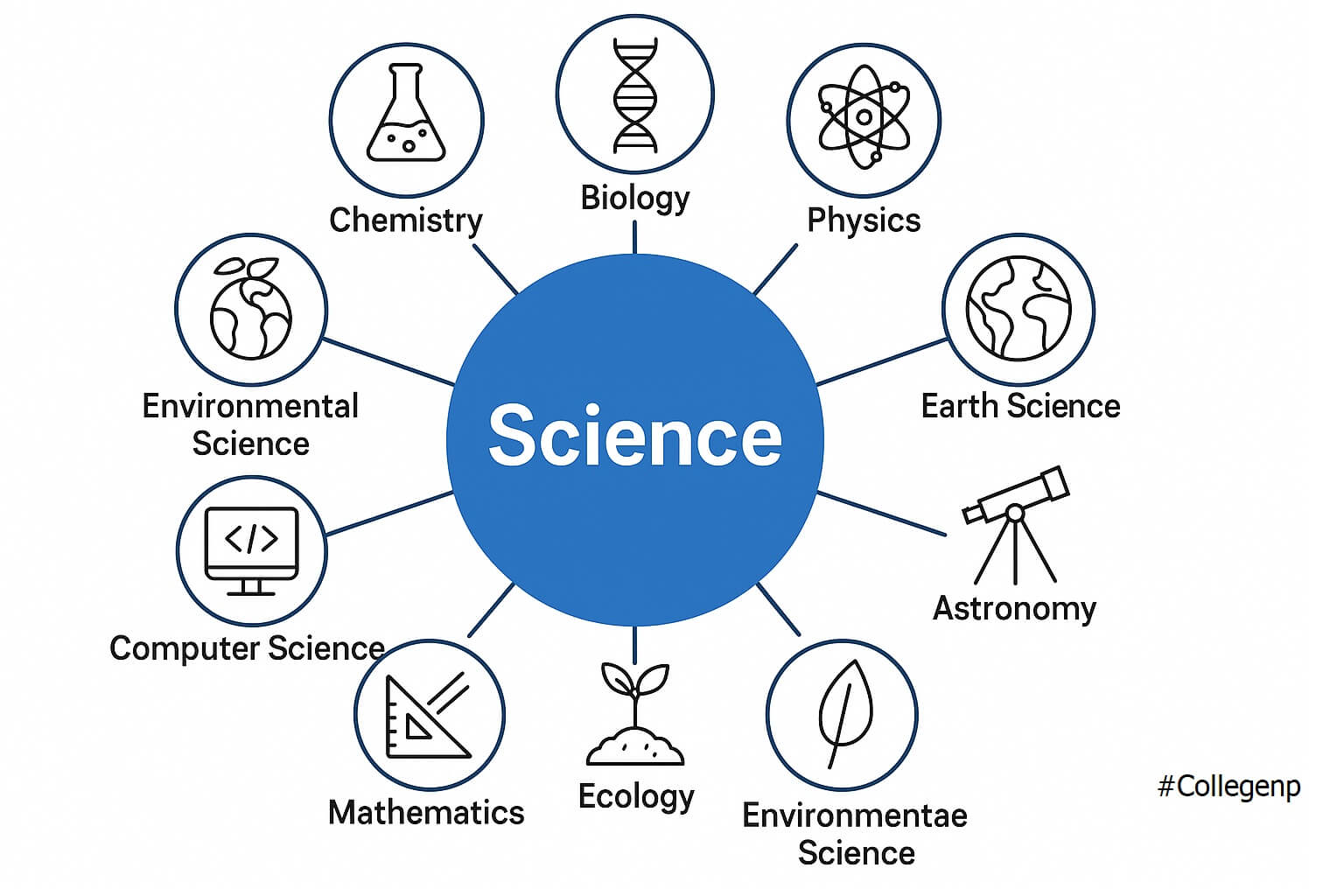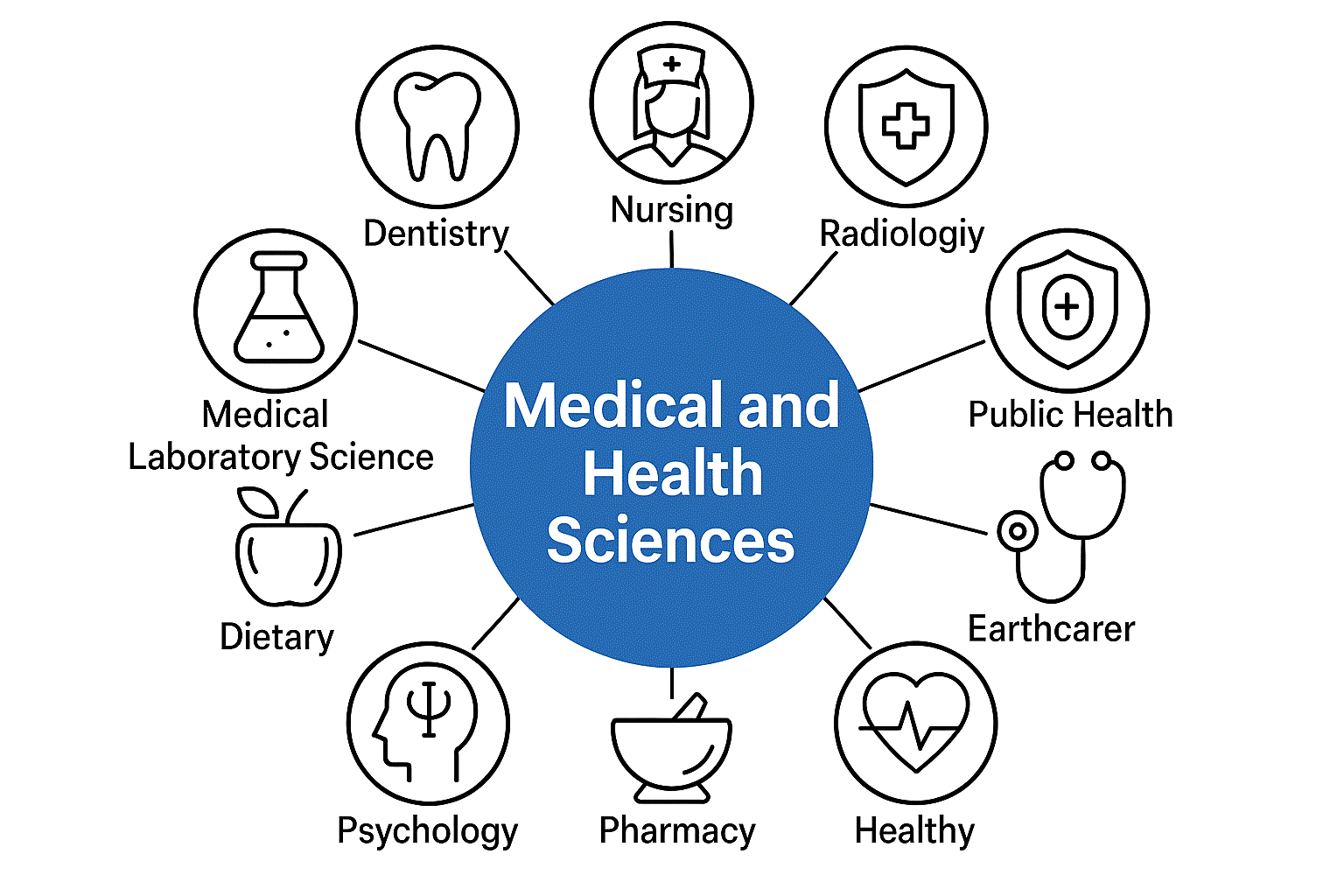
Finishing grade 12 with a science background often brings mixed feelings. Relief. Excitement. And, quite often, confusion. What comes next? There’s no shortage of options in Nepal—engineering, medicine, IT, agriculture, pure sciences—but the challenge isn’t choosing from a list. It’s choosing what fits. Not what’s trending or what someone else picked, but what genuinely matches your strengths, curiosity, and long-term goals.
That’s easier said than done. Many students second-guess their path or chase fields that looked good on paper but didn’t match their reality. So, how do you make the right decision that works for your future? That’s where this guide comes in. We’ll walk through Nepal's most popular and promising science courses after 12th grade—what they’re about, who they suit, where to study, and the careers they open up. You’ll find facts, examples, and real-world perspectives to help you make a confident choice.
Table of Content
- Why It Matters
- Science Streams: PCM and PCB
- Engineering Options
- Emerging Specializations
- Medical and Health Sciences
- Top Colleges for Medical and Health Sciences
- Information Technology and Computer Science
- Biotechnology, Agriculture, and Forestry
- How to Make the Right Choice
- Where to Study
- What’s the Job Scene Like?
- Conclusion
- FAQs
Why It Matters
Your choice isn’t just about the next four years. It sets the tone for where you’ll likely spend your energy, develop your skills, and find your first job. Getting it right means aligning your natural interests with real opportunities. Learning becomes less of a struggle and more of a motivation when that happens.
Science Streams: PCM and PCB
Before you dive into specific courses, let’s clear up one big filter: your subject combination in +2.
-
PCM (Physics, Chemistry, Mathematics): Opens doors to engineering, architecture, and IT.
-
PCB (Physics, Chemistry, Biology): Leads into medicine, nursing, pharmacy, and other life sciences.
Depending on the college, some courses like Environmental Science or Biotechnology may welcome both streams.

|
Course |
Duration |
Eligibility |
Potential Career Paths |
General Scope in Nepal |
|
Bachelor of Engineering (BE) |
4 years |
Science stream in 10+2 with required marks, and an entrance exam. |
Computer Engineer, Civil Engineer, Electrical Engineer, Mechanical Engineer, Software Engineer, etc. |
Good, especially in IT, infrastructure, and energy sectors |
|
MBBS (Bachelor of Medicine and Bachelor of Surgery) |
5.5 years |
Science stream in 10+2 with Biology, required marks, and entrance exam. |
Doctor, Specialist Doctor, Medical Officer |
High demand in hospitals, clinics, and healthcare organizations |
|
BSc Nursing |
4 years |
Science stream in 10+2 with Physics, Chemistry, Biology, minimum marks, entrance exam |
Registered Nurse, Nursing Supervisor, Nurse Educator |
Good, with opportunities in Nepal and abroad |
|
Bachelor of Pharmacy (B. Pharm) |
4 years |
Science stream in 10+2 with required marks, entrance exam |
Pharmacist, Drug Inspector, Pharmaceutical Researcher |
Growing demand in pharmaceutical industries and healthcare settings |
|
BSc Physics |
3-4 years |
Science stream in 10+2 with Physics, Mathematics, required marks |
Research Scientist, Lecturer, Data Analyst 10 |
Opportunities in research, academia, and some industries |
|
BSc Chemistry |
3-4 years |
Science stream in 10+2 with Chemistry, required marks |
Research Scientist, Quality Control Analyst, Lab Technician |
Opportunities in chemical industries, research, and education |
|
BSc Biology |
3-4 years |
Science stream in 10+2 with Biology, required marks |
Research Scientist, Microbiologist, Biotechnologist |
Growing opportunities in research, healthcare, and biotechnology |
|
BSc Mathematics |
3-4 years |
Science stream in 10+2 with Mathematics, required marks |
Data Analyst, Statistician, Researcher |
Increasing demand in data analysis and related fields |
|
BSc Environmental Science |
4 years |
Science stream in 10+2 with required marks |
Environmental Consultant, Conservationist, Researcher |
Growing importance with increasing environmental awareness |
|
BSc CSIT (Bachelor of Science in Computer Science and Information Technology) |
4 years |
Science stream in 10+2 with required marks, entrance exam |
Software Developer, IT Analyst, Data Scientist, Cybersecurity Expert |
High demand in the booming IT sector |
|
BIT (Bachelor of Information Technology) |
3-4 years |
Science stream in 10+2 with required marks |
Web Developer, Network Administrator, Software Developer |
Strong demand in the IT industry |
|
BCA (Bachelor of Computer Applications) |
4 years |
Any stream in 10+2 with required marks, entrance exam |
System Analyst, System Manager, Database Administrator |
Good opportunities in IT and management sectors |
|
BTech Biotechnology |
4 years |
Science stream in 10+2 with Biology, required marks, entrance exam |
Biotechnologist, Research Scientist, Quality Control Officer |
Emerging field with potential in agriculture, medicine, and industry |
|
BSc Agriculture |
4 years |
Science stream in 10+2 with required marks, entrance exam |
Agricultural Officer, Agronomist, Farm Manager |
Significant opportunities in Nepal's agrarian economy |
|
BSc Forestry |
4 years |
Science stream in 10+2 with required marks, entrance exam |
Forester, Conservationist, Environmental Consultant |
Important for natural resource management and conservation |
|
Bachelor of Architecture (B. Arch) |
5 years |
Science stream in 10+2 with Physics, Chemistry, Mathematics, required marks, entrance exam |
Architect, Urban Planner, Interior Designer |
Growing demand in urban development and construction |
Engineering Options
Engineering’s long-standing popularity isn’t surprising. It’s a practical field with clear job prospects and defined career paths.
Computer Engineering
With Nepal’s growing tech sector, this field makes sense if you enjoy coding, building systems, or understanding how software and hardware work together. You’ll likely work in software companies, data analytics, cybersecurity, or freelancing. Many students say their internships were the game-changer that helped them land their first job.
Civil Engineering
Nepal’s infrastructure is expanding—think highways, tunnels, and urban planning. Civil engineers are right at the center of that. This could be for you if you like structural design and on-site challenges.
Electrical Engineering
Electrical engineers tackle real-world energy problems, from designing home circuits to working in hydropower plants. Urbanization and energy needs mean there’s plenty of work.
Mechanical Engineering
One of the broadest fields. You could end up in manufacturing, automobile design, or renewable energy. It’s ideal for those who love machines and how they work.
Emerging Specializations
Nepal is gradually introducing fields like:
-
Aerospace Engineering
-
Biomedical Engineering
-
Agricultural Engineering
-
Electronics and Communication Engineering
These are still evolving but show promise for future opportunities.
Medical and Health Sciences

If you enjoy helping others, solving health issues, or working in hospitals, the medical field might fit you.
MBBS
One of the most respected (and demanding) degrees in Nepal. It takes 5.5 years, including a full year of internship. But this path is worth exploring if you’ve always imagined wearing the white coat.
BDS
Dentistry offers a fulfilling career and a slightly less time commitment. You’ll be treating real people, improving lives—sometimes by simply fixing a smile.
BSc Nursing
Nursing students often share how their practical sessions and community health projects changed how they saw healthcare. This course blends science with empathy, offering jobs at hospitals, NGOs, and even abroad.
B. Pharm
Think about the science behind the medicine. Pharmacists play a key role in ensuring patients receive the proper medication safely. If you’re detail-oriented and love chemistry, this could be your calling.
Bachelor of Public Health (BPH)
It’s less about hospitals and more about improving community health through education, policy, and preventive strategies. Perfect for those who want to make a broad impact.
Top Colleges for Medical and Health Sciences
-
Institute of Medicine, TU
-
Kathmandu University School of Medical Sciences
-
Pokhara University
-
Purbanchal University
Pure Sciences: BSc Degrees
These degrees focus more on theory, research, and academic depth. Great for students interested in teaching, further studies, or laboratory work.
BSc Physics
You’ll dive into mechanics, thermodynamics, and quantum theories. Graduates often go into teaching or research, but others find roles in tech, data analysis, and renewable energy.
BSc Chemistry
Chemical reactions, molecular structures, and industrial applications are all foundational in chemistry, which is also foundational in pharmaceuticals, cosmetics, and environmental testing.
BSc Biology
Want to study life? This field covers everything from genetics to ecology. Many biology students continue into biotechnology, research, or education.
BSc Mathematics
From statistics to abstract algebra, math students sharpen logic and problem-solving skills that work well in finance, software, and research.
BSc Environmental Science
One student shared how a class field visit to a conservation site changed their perspective. This program tackles pollution, conservation, and sustainable living. If climate and ecology matter to you, take a closer look.
Other Science Options
-
Microbiology
-
Geology
-
Biotechnology
-
Statistics
These fields are often paired with specialized careers or postgraduate studies.
Information Technology and Computer Science
IT is booming. Whether you want to work in Nepal or remotely for a foreign company, tech skills are in demand.
BSc CSIT
Combines software development, networking, and data handling. Most students get hands-on training and internship opportunities by the third year.
BIT
It is more practical and less theoretical than CSIT. It is great for those who want to enter the workforce quickly with IT management or development skills.
BCA
A computer application course that’s accessible even to students from other streams. It blends technical and business IT knowledge.
Bachelor in Data Science
This field is growing rapidly. As data becomes the core of decision-making, data science graduates are needed in health, business, government, and other fields.
Biotechnology, Agriculture, and Forestry
Biotech
This field combines biology and technology to develop medicine, agriculture, and industry solutions. Research roles and lab work are common career routes.
Agriculture
This course makes sense if you want to improve food production or support farmers with better techniques. It connects classroom science with real-world applications.
Forestry
Nepal’s forest reserves are massive. This degree trains students to protect, manage, and restore ecosystems. You might end up working in conservation or national parks.
Architecture
Science meets design here. Over five years, you’ll study structure, materials, and aesthetics. Graduates work in firms, design consultancies, or set up their studios.
How to Make the Right Choice
-
Ask yourself: What excites you more—machines, medicine, numbers, or nature?
-
Talk to people already in the field
-
Visit colleges and attend open sessions
-
Look into job placements and internships offered
-
Check affordability and scholarship options
Where to Study
-
Tribhuvan University
-
Kathmandu University
-
Pokhara University
-
Purbanchal University
-
Agriculture and Forestry University
What’s the Job Scene Like?
-
IT and engineering grads often land jobs quickly
-
Medical and nursing roles are stable, both in Nepal and abroad
-
Environmental and agricultural sectors are growing due to global and local needs
-
Data science is new, but picking up pace
Financial Aid and Scholarships
Scholarships are available for entrance toppers and need-based applicants. Do your homework early—deadlines come fast.
Personal Advice
A friend of mine started with Physics but switched to Data Science after realizing they enjoyed solving problems more than lab work. Today, they work for an international firm from Kathmandu. The takeaway? Be flexible. Be honest with yourself.
Conclusion
Science students after 12th in Nepal have incredible opportunities. But the best course is the one that resonates with you. The decision may feel big now, but it’s the beginning of a journey, not the final stop.
FAQs
-
What science course is in demand the most in Nepal?
-
IT and medical-related fields are currently leading the demand chart.
-
-
Can I study science without Mathematics?
-
Yes. Courses like MBBS, Nursing, and BSc Biology don’t require math.
-
-
What are the best government colleges for science courses?
-
IOE, IOM, Kathmandu University, and Agriculture and Forestry University are strong choices.
-
-
How do I know if I should go into research or practical fields?
-
Think about whether you enjoy experiments and reading more than hands-on work or vice versa. Internships can help you decide.
-
-
Are international scholarships available for these courses?
-
Yes, especially for agriculture, environmental science, and IT programs. Research early and apply on time.
-





